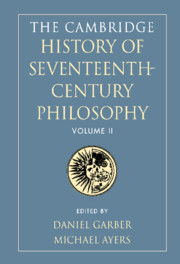29 - Theories of knowledge and belief
from VI - The Understanding
Published online by Cambridge University Press: 28 March 2008
Summary
GODS AND GIANTS
Introduction
Here is a traditional view. The conception of knowledge as an infallible cognitive act was a distinctively seventeenth-century manifestation and consequence of a new obsession with doubt and its resolution. Whereas earlier epistemology, following Plato and Aristotle, had focussed on the move from particular beliefs to general science (‘the Problem of Universals’), Cartesian and post–Cartesian epistemology was very differently shaped by a scepticism which extended even to the existence of material objects (‘the Problem of Perception’). The latter took the form of a new quest for certainty and ‘given’ foundations which, although dominated by the metaphors of sight and enlightenment, in fact spread a veil–indeed, drove an ontological wedge — between subject and object, a thinking self and an ‘external’ world. Two schools of philosophy are assigned their origin in this supposedly novel problematic. ‘Rationalists’ sought a remedy for doubt in quasi–geometrical systems built on supposedly innate axioms evident to the self in independence of the world, while ‘Empiricists’, with equal egocentricity, looked for the foundations of knowledge in the pure content of sensory experience.
- Type
- Chapter
- Information
- The Cambridge History of Seventeenth-century Philosophy , pp. 1003 - 1061Publisher: Cambridge University PressPrint publication year: 2000
References
- 5
- Cited by

